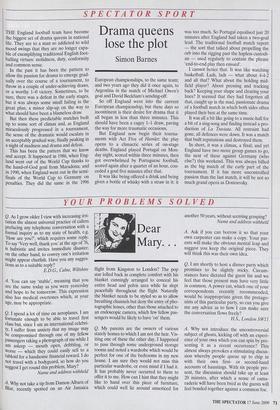SPECTATOR SPORT
THE England football team have become the biggest set of drama queens in national life. They are to a man so addicted to wild mood swings that they are no longer capa- ble of exemplifying traditional English foot- balling virtues: stolidness, duty, conformity and common sense.
In the past it has been the pattern to allow the passion for drama to emerge grad- ually over the course of a tournament, to throw in a couple of under-achieving draws, or a worthy 1-0 victory. Sometimes, to be sure, there was a defeat in the early stages, but it was always some small failing in the great plan, a minor slip-up on the way to what should have been a blameless draw.
But then these predictable matches built up to some sort of climax and, as England miraculously progressed in a tournament, the sense of the dramatic would escalate in an acceptably gradual way, finally peaking in a night of madness and drama and defeat. This has been the pattern that we know and accept. It happened in 1986, when Eng- land went out of the World Cup thanks to the hand-of-God goal from Maradona; and in 1990, when England went out in the semi- finals of the World Cup to Germany on penalties. They did the same in the 1996
Drama queens lose the plot
Simon Barnes
European championships, to the same team; and two years ago they did it once again, to Argentina in the match of Michael Owen's goal and David Beckham's sending-off.
So off England went into the current European championship, but these days so incontinent is their desire for drama that it all began in less than three minutes. This should have been a cagey 1-1 draw, paving the way for more traumatic occasions.
But England now begin their tourna- ments with Act Five of Hamlet: the play opens to a climactic series of on-stage deaths. England played Portugal on Mon- day night, scored within three minutes, then got overwhelmed by Portuguese football, scored again after a quarter of an hour, con- ceded a goal five minutes after that.
It was like being offered a drink and being given a bottle of whisky with a straw in it: it was too much. So Portugal equalised just 20 minutes after England had taken a two-goal lead. The traditional football match report — the sort that talked about propelling the orb into the rigging past the hapless custodi- an — used regularly to contain the phrase 'end-to-end play then ensued'.
I cannot better that. It was like watching basketball. Lads, lads — what about 4-4-2 and all that? What about the holding mid- field player? About pressing and tracking back? Keeping your shape and clearing your lines? It seemed that they had forgotten all that, caught up in the mad, passionate drama of a football match in which both sides often played their best at the same time.
It was all a bit like going to a music-hall for a bit of a sing-song and finding instead a pro- duction of La Traviata. All restraint had gone, all defences were down. It was a match that built reputations and destroyed them.
In short, it was a climax, a final; and yet England have two more group games to go, the next of these against Germany (who else?) this weekend. This was always billed as the big match of the early part of the tournament. If it has more uncontrolled passion than the last match, it will be not so much grand opera as Dostoevsky.










































































 Previous page
Previous page